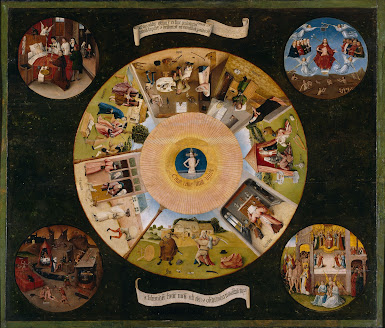Proverbs 6:12-19
A few months ago I wrote about sin, in which I lamented the Church's historical tendency to "a way of thinking that sliced and diced, analyzed and categorized sin into smaller and smaller bits. I spoke of the relationship of petty sin to petty virtue. What I failed to say in my previous essay is that guilt is pointless. It is guilt that the Church is often accused of fostering by this pettiness, and to some extent that may be a fair judgement. Guilt is a kind of self-centered wallowing. Repentance, on the other hand, is an outward turning reach for The Other, a turning away from what pulls you down. The fundamental necessity is to empty ourselves in order to be filled with the love of Christ, not to keep, no never that, but to be overflowing into the world around us.
The poet, Sara Teasdale, put it this way:
A few months ago I wrote about sin, in which I lamented the Church's historical tendency to "a way of thinking that sliced and diced, analyzed and categorized sin into smaller and smaller bits. I spoke of the relationship of petty sin to petty virtue. What I failed to say in my previous essay is that guilt is pointless. It is guilt that the Church is often accused of fostering by this pettiness, and to some extent that may be a fair judgement. Guilt is a kind of self-centered wallowing. Repentance, on the other hand, is an outward turning reach for The Other, a turning away from what pulls you down. The fundamental necessity is to empty ourselves in order to be filled with the love of Christ, not to keep, no never that, but to be overflowing into the world around us.
The poet, Sara Teasdale, put it this way:
Child, child, love while you may,For life is short as a happy day;Never fear the thing you feel-Only by love is life made real;Love, for the deadly sins are seven,Only through love will you enter heaven.
Whether she intended it or not, love is presented as the antidote to sin.
But of what do we empty ourselves? What is it that I should be repenting? It came to me in prayer this week that my starting point for my pondering about repentance and the Sacrament of Reconciliation might have a starting point in the traditional Seven Deadly Sins, the deeper, underlying habits of action or thought that lay behind the things we do.
The list has a long history. Our current version was solidified by Saint Gregory I in 590, but it has its roots in the Egyptian monastic movement two centuries before. The concept is even older. Greek and Roman philosophers long pondered patterns of thought and habit that lay behind a lack of virtue. Aristotle wrote extensively on virtue and saw vice as a existing in mirror image to virtue (Courage he thought, for example, is a virtue, but too much is recklessness and too little cowardice.)
I've begun to think of the list as descriptions of the barriers, the blockage, that keeps me from emptying and fully entering into the life of Christ. So what are they? The traditional list is:
- Lust
- Gluttony
- Greed
- Sloth
- Wrath
- Envy
- Pride
Over my next posts I'll ponder them one by one in the traditional order, and ponder also the related virtues and good, the way in which love is the antidote to sin.




No comments:
Post a Comment